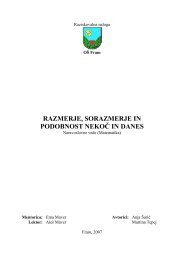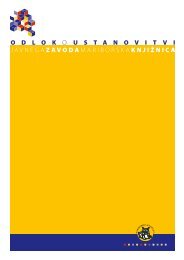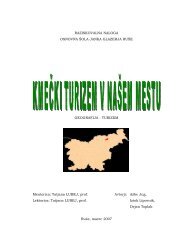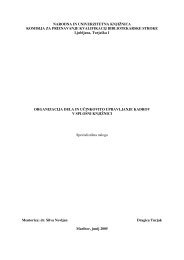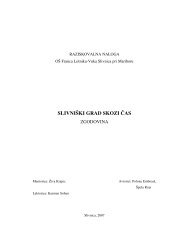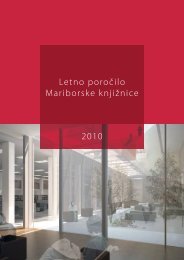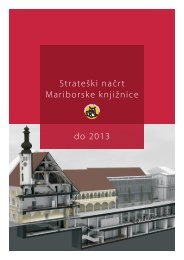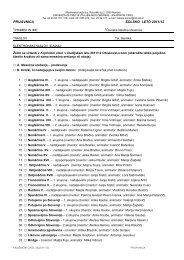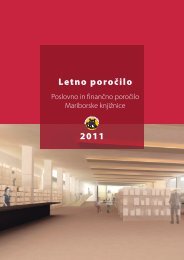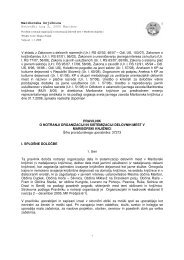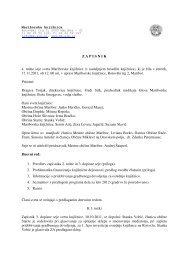Intranet in Aarhus Municipal Libraries
Intranet in Aarhus Municipal Libraries
Intranet in Aarhus Municipal Libraries
You also want an ePaper? Increase the reach of your titles
YUMPU automatically turns print PDFs into web optimized ePapers that Google loves.
Zveza bibliotekarskih društev Slovenije - Library Association of Slovenia<br />
Sekcija za splošnoizobraževalne knjižnice - Section of Public <strong>Libraries</strong><br />
Posvetovanje splošnoizobraževalnih knjižnic Slovenije<br />
Conference of Slovene Public <strong>Libraries</strong><br />
INTERNO KOMUNICIRANJE<br />
INTERNAL COMMUNICATION<br />
Gozd Martuljek, September 25/26, 2000<br />
<strong>Intranet</strong> <strong>in</strong> <strong>Aarhus</strong> <strong>Municipal</strong> <strong>Libraries</strong><br />
Lisbeth Christensen, <strong>Aarhus</strong> Kommunes Biblioteker, Danska (Denmark)<br />
I will now say a little about one of the other fields which I have worked with <strong>in</strong> <strong>Aarhus</strong><br />
<strong>Municipal</strong> <strong>Libraries</strong> - namely establish<strong>in</strong>g an <strong>in</strong>tranet for the library.<br />
It has been a long and at times - confus<strong>in</strong>g - proces, and we have had small homemade<br />
solutions, half solutions, and now we are about to establish a whole - and more professional -<br />
<strong>in</strong>tranet.<br />
Background<br />
To understand the background for the <strong>in</strong>tranet I will say someth<strong>in</strong>g about the organisational<br />
and technological conditions at <strong>Aarhus</strong> <strong>Municipal</strong> <strong>Libraries</strong>:<br />
About 330 employees: Ma<strong>in</strong> Library, 19 local libraries, 2 mobile libraries, 1 adm<strong>in</strong>istration<br />
and 1 development department.<br />
10 % of the staff have a high degree of adm<strong>in</strong>istrative work<br />
20 % of the staff have a medium degree of adm<strong>in</strong>istrative work<br />
50 % of the staff have a m<strong>in</strong>imum of adm<strong>in</strong>istrative work<br />
20 % of the staff have no adm<strong>in</strong>istrative work at all.<br />
The 2 first groups are the so-called SETTLERS (30 %) and they have a table, a chair and a pc<br />
of their own. They work <strong>in</strong> the adm<strong>in</strong>istration (pay office, accounts, leaders), and they have a<br />
fully equipped office system “Lotus Notes” with connection to the other adm<strong>in</strong>istrative<br />
work<strong>in</strong>g places <strong>in</strong> the municipality (the Townhall etc.).<br />
The 2 last groups are the so-called NOMADES (70 %) and they have no pc of their own, they<br />
share with other employees, they work <strong>in</strong> the lend<strong>in</strong>g desk, at the <strong>in</strong>formation po<strong>in</strong>ts, maybe<br />
at two various branch libraries, <strong>in</strong> the canteen, <strong>in</strong> the mobile libraries etc.<br />
In short: they move from place to place, and they have a mail system based upon a browser or<br />
a diskette.
That means that everyone <strong>in</strong> the libraries do not have the same platform, or the same version<br />
of the same browser. If everyone should have the same system, it would mean extra expenses<br />
for the library of about 1 mio Danish kroner each year (about 150.000 Euros).<br />
The nomades have only little time - less than ˝ hour <strong>in</strong> all (10 m<strong>in</strong>utes each time) dur<strong>in</strong>g a<br />
work<strong>in</strong>g day to check the <strong>in</strong>tranet (mails, calendar, news), therefore it is important that the<br />
services are designed precisely towards the users’ needs.<br />
All this might seem as barriers for an effective <strong>in</strong>tranet solution, but even greater barriers are<br />
other factors. In “Delphi Source of Knowledge Managements” there has been an overview of<br />
the most important barriers for success for an <strong>in</strong>tranet, and as you see it seems that the cultural<br />
barriers are far more important than the technical:<br />
Barriers for success for an <strong>in</strong>tranet:<br />
53 % culture<br />
20 % <strong>in</strong>sufficient technology<br />
15 % <strong>in</strong>sufficient content<br />
9 % costs<br />
3% no need<br />
When study<strong>in</strong>g various sources for guidel<strong>in</strong>es for build<strong>in</strong>g usable <strong>in</strong>tranet sites you f<strong>in</strong>d that<br />
some or all of these guidel<strong>in</strong>es are provided if you want success:<br />
1. Know your audience.<br />
2. Deliver work productivity.<br />
3. Emphasize breadth over depth.<br />
4. M<strong>in</strong>imize the graphics.<br />
And now I am go<strong>in</strong>g to say someth<strong>in</strong>g about the basic pr<strong>in</strong>ciples for the <strong>in</strong>tranet <strong>in</strong> <strong>Aarhus</strong> on<br />
these conditions, and I will present some of the facilities.<br />
Basic pr<strong>in</strong>ciples:<br />
“It must be faster to look for the required <strong>in</strong>formation at the <strong>in</strong>tranet than not to look for it”<br />
The best technical and organizational solution we could f<strong>in</strong>d was creat<strong>in</strong>g a comb<strong>in</strong>ation of an<br />
“Information-portal” with a proactive “Mail-notification System” - both accessible from the a<br />
browser no matter where <strong>in</strong> the library you are.<br />
“Through a personalized po<strong>in</strong>t-of-view the focus is moved from “Inform” to “Act”
The <strong>in</strong>tranet <strong>in</strong> <strong>Aarhus</strong> <strong>Municipal</strong> <strong>Libraries</strong> consists of a number of facilities, and all of them<br />
have search functions. They are <strong>in</strong>dexed with keywords, and can also be found through free<br />
text search.<br />
1) General <strong>in</strong>formation (names, telephone, mail adresses for the staff) - always up-to-date<br />
and searchable. A database of labels for all cooperation partners of the library (1330 adresses<br />
on about 40 groups). Danish and foreign libraries.<br />
2) Internal newsagent (via subscription) arrangements for the staff (vision proces etc.)<br />
3) Internal “newspaper” (news every month plus discussion, buy<strong>in</strong>g-sell<strong>in</strong>g etc.). It stopped<br />
via paper 1 month ago.<br />
The end<strong>in</strong>g of the pr<strong>in</strong>ted version was a very great change for the staff - <strong>in</strong>deed much more<br />
than most of the rest of the <strong>in</strong>tranet - the <strong>in</strong>ternal newspaper had been pr<strong>in</strong>ted on paper every<br />
month s<strong>in</strong>ce 1934, and people have been used to read it <strong>in</strong> the bus when they og home from<br />
their job. All the staff were offered a pr<strong>in</strong>ted version, but all except 10 persons have now<br />
chosen the netbased version.<br />
4) Documents (library staff politics, adm<strong>in</strong>istrative practice: rules about holidays, leaves,<br />
dismissals etc.)<br />
5) Mail<br />
6) Calender<br />
7) Internal discussions <strong>in</strong> relation to agendas to meet<strong>in</strong>gs, visions, goals etc.<br />
8) Workflow (IT HelpDesk, participation <strong>in</strong> <strong>in</strong>ternal or external courses etc.)<br />
9) FAQ’s and list-servers for smaller or larger groups<br />
Most <strong>in</strong>formation has been structured so that the members of the staff subscribe to certa<strong>in</strong><br />
types of documents or news through a subscription database or through listservers. It means<br />
that if you are work<strong>in</strong>g with <strong>in</strong>formation technology, you can subscribe to a listserver where<br />
new projects are presented and discussed. If you work with licenses for electronic full-text<br />
documents, you can enter a group with persons with<strong>in</strong> the library with the same work<strong>in</strong>g<br />
fields. The same with many other specialist areas: library service for fugitives and immigrants<br />
a.s.o.<br />
For some sort of <strong>in</strong>formation you are automatically a subscriber. That could be decisionreports<br />
from meet<strong>in</strong>gs, for <strong>in</strong>stance <strong>in</strong> the leadergroup for the whole library. All the<br />
department leaders can not unsubscribe. The communication system is based upon the fact<br />
that all leaders are <strong>in</strong>formed and develop their department towards mutual decisions.<br />
But it is always the responsibility of each employee to keep <strong>in</strong>formed about mutual decisions<br />
<strong>in</strong> the <strong>in</strong>stitution and act after that. The process of <strong>in</strong>form<strong>in</strong>g from chief librarians to<br />
department leaders to the staff has <strong>in</strong> this way been m<strong>in</strong>imized.
An extranet between <strong>Aarhus</strong> <strong>Municipal</strong> <strong>Libraries</strong> and the libraries <strong>in</strong> the county is established<br />
as pure Internet-based with log<strong>in</strong> procedures to more sensitive <strong>in</strong>formation. In the future this<br />
function will partly <strong>in</strong>tegrated with the library <strong>in</strong>tranet.<br />
“Knowledge versus skill is mov<strong>in</strong>g from “How” to “Why and when”<br />
The <strong>in</strong>tranet is structured so that you can always search for a certa<strong>in</strong> topic <strong>in</strong> the databases, for<br />
example <strong>in</strong> the “Meet<strong>in</strong>g Base”: you can make free-text searchs and all the documents have<br />
added some <strong>in</strong>dex data or metadata. If you want to see the workflow of a case - Open<strong>in</strong>g<br />
hours on Sundays - you can follow it through the various meet<strong>in</strong>gs and see the actual status,<br />
who is responsible for lead<strong>in</strong>g it on, what is the deadl<strong>in</strong>e, and - if the case is not closed - you<br />
can debate it with the responsible persons <strong>in</strong> an open forum for all the staff.<br />
In the “IT HelpDesk” you can see the status on your computer problem: who is responsible<br />
for repair<strong>in</strong>g it, what is the deadl<strong>in</strong>e, are there others <strong>in</strong> the library who have had the same<br />
problem, and could it be possible that they had solved the problem on their own, without the<br />
help from specialists.<br />
You can f<strong>in</strong>d the names of all superusers <strong>in</strong> the systems and the total documentation for the<br />
catalogu<strong>in</strong>g format and the library automation system, <strong>in</strong>clud<strong>in</strong>g “known” errors. It means<br />
that if you f.ex. f<strong>in</strong>d a mistake <strong>in</strong> the <strong>in</strong>terlend<strong>in</strong>g library loan system, you can immediately<br />
see, if there is be<strong>in</strong>g worked on solv<strong>in</strong>g it, or if you are the first to f<strong>in</strong>d out.<br />
In the “Library DataWarehouse” you can see all statistical <strong>in</strong>formation about for <strong>in</strong>stance the<br />
library automation system: lend<strong>in</strong>gs, stocks, visits, arrangements, borrowers categories e.g.<br />
and you are able to comb<strong>in</strong>e it <strong>in</strong> whatever way you might want to. The data are presented <strong>in</strong> a<br />
non-personal way (anonymous) and the comb<strong>in</strong>ation possibilities are numerous.<br />
“As little <strong>in</strong>formation as possible, but all the relevant <strong>in</strong>formation”<br />
It is important that all relevant <strong>in</strong>formation is present and that you are able to f<strong>in</strong>d it quickly.<br />
All papers used <strong>in</strong> the daily life at the library should be available, and it is our <strong>in</strong>tention to<br />
digitize all formulas, so that the staff can pr<strong>in</strong>t it out or send it electronically on-demand.<br />
We have started the proces, but it has implications concern<strong>in</strong>g digital signatures. If you send<br />
an electronic formula it is required that the receiver can be absolutely sure, that it comes from<br />
you and nobody else.<br />
That could be holiday formulas, illness reports, but also less sensitive <strong>in</strong>formation as the<br />
service of requir<strong>in</strong>g posters and signs to your library etc.<br />
A mutual calendar is a great wish among the staff, but we have found no proper technical<br />
solution on that po<strong>in</strong>t because of our various platforms. If we ever get such a tool it would<br />
make it easy to get an overview of the status at any time: who are <strong>in</strong> the <strong>in</strong>formation desk,<br />
who are at the offices, who are on holiday and who are sick etc.<br />
“The cumulated specialist knowledge among the staff (the knowledge capital) belongs to the<br />
library and can thereby be shared by the other employees”
With more and more <strong>in</strong>formation available through this portal, the library beg<strong>in</strong>s to appreciate<br />
the magnitude of its knowledge capital and the value of be<strong>in</strong>g able to search across its entire<br />
<strong>in</strong>formation base <strong>in</strong>stantly.<br />
You also see this tendencies very strongly <strong>in</strong> private enterprises. One of the chiefs <strong>in</strong> Hewlett-<br />
Packard says: "If we knew what we knew, we would be 30 % more profitable.”<br />
Through an <strong>in</strong>tranet, a grow<strong>in</strong>g variety of structured and unstructured data and documents and<br />
a grow<strong>in</strong>g array of simple services are available.<br />
The full development of the <strong>in</strong>tranet’s <strong>in</strong>formation-shar<strong>in</strong>g potential requires confidence and<br />
trust among the staff and among staff and leaders concern<strong>in</strong>g “The <strong>in</strong>tellectual capital of the<br />
library”.



